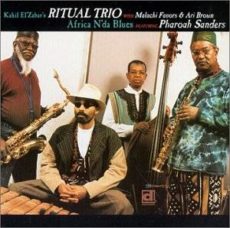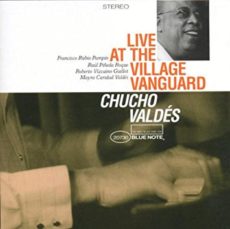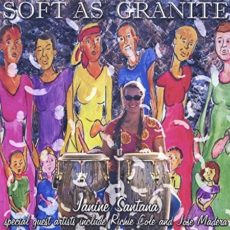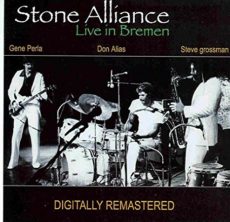
Daily Dose Of Jazz…
Kahil El’Zabar was born on November 11, 1953 in Chicago, Illinois and attended Lake Forest College before joining the AACM, Association for the Advancement of Creative Musicians in the early 1970s. He would go on to become its chairman in 1975.
During the 1970s, he formed the musical groups Ritual Trio and the Ethnic Heritage Ensemble, both of which have remained active. Kahil has collaborated include Dizzy Gillespie, Stevie Wonder, Nina Simone, Cannonball Adderley, and Paul Simon.
The multi-instrumentalist, Kahil El’Zabar, who is mainly a percussionist and composer, regularly records for Delmark Records. As a leader and co-leader he has released eight albums, fourteen with the Ensemble, 14 with the Trio, two with the group Tri-Factor and has recorded four as a sideman with David Murray and Wadada Leo Smith. He continues to perform, compose and record.
More Posts: percussion

Daily Dose Of Jazz…
Raul Pineda was born on November 5, 1971 in Havana, Cuba. As a young boy, he scoured his neighborhood for anything that could be used to create drums. He used metal rods driven into the ground to support used cooking oil cans, and formed drumsticks from the branches of orange trees. He was influenced by the local rumbero street bands, and at the urging of his musician grandfather, Nefer Miguel Milanés, he went on to study classical percussion for several years. He then immersed himself in Afro-Cuban music.
By 19, Raul was performing and recording with some of the leading Cuban ensembles and bandleaders, including Sentisis, and pianist Chucho Valdés. Over the next several years, international tours and Grammy-nominated recordings brought Raul to the music world’s attention as one of Cuba’s most influential young drummers. He blends a drum kit with percussion instruments, such as, the left foot cowbell.
Staying busy playing and recording with several bands and artists, since 2000, he has been playing with the Afro-Cuban-jazz-funk-rock band TIZER and with Latin superstar Juan Gabriel. Between the two bands he will have toured Venezuela, Colombia, Mexico, Dubai, Barbados, Aruba, Santiago de Chile, South Africa, Russia and South Korea.
Drummer Raul Pineda has garnered three Grammy nominations and a 2000 Grammy Award for Best Latin Jazz Performance with the Chucho Valdés Quartet album, Live at the Village Vanguard. He continues to perform and record.
More Posts: drums,percussion

Daily Dose Of Jazz…
Janine Santana was born January 28th in Brooklyn, New York of Puerto Rican and Finnish ancestry and spent her childhood in Brooklyn and youth in Trenton, New Jersey. She developed a love for Afro-Cuban/ Caribbean traditions and Jazz and began working and studying as a professional actor at a very young age, long before studying music at Aims Community College.
A 1994 move to Denver, Colorado focused her more on performance, music recording and broadcasting. She leads a 6-12 piece Latin Jazz Ensemble and her well received 2009 recording Soft as Granite had Janine working with alto saxophonist Richie Cole, trumpeters Greg Gisbert and Brad Goode, and arranger/percussionist José Madera.
Conguera, percussionist, leader, arranger, studio musician, broadcaster, artist, designer, writer and actor Janine Santana currently continues to perform, record and collaborating with generations of jazz and Latin jazz musicians on a brand new project with the likes of Luques Curtis, Bobby Porcelli, David Amram, Jose’ Madera on timbales and arrangements, Ricky Gonzalez as producer/pianist/arranger and Ray Vega on trumpets.
![]()
#preserving genius
More Posts: conga,percussion

Daily Dose Of Jazz…
Charles “Don” Alias was born on December 25, 1939 in Harlem, New York City, the son of Caribbean immigrants. Absorbing the lessons of neighborhood Cuban and Puerto Rican hand drummers, while in high school he played conga with the Eartha Kitt Dance Foundation, and in 1957 accompanied the singer at the Newport Jazz Festival.
Mothballing his musical career to study biology at Erie, Pennsylvania’s Cannon College, he followed those studies with a stint at Boston’s Carnegie Institute for Biochemistry. While there Alias regularly moonlighted at local clubs in the company of students of the nearby Berklee School of Music, among them conguero Bill Fitch and bassist Gene Perla, and played bass in a short-lived trio featuring Chick Corea on guitar and Tony Williams on drums.
When Perla landed a gig with Nina Simone, he convinced the singer to hire Alias to assume drumming duties. By the end of his three-year residency he was serving as musical director, and eventually captured the attention of Miles Davis, with whom Simone regularly shared festival bills. He would go on to record four albums with Miles Davis including sitting in to play the drums on the recording of Miles Runs the Voodoo Down on the album Bitches Brew in 1969, when neither Lenny White nor Jack DeJohnette were able to play the marching band-inspired rhythm.
Settling back in New York City in the late Seventies he along with Gene Perla formed the Afro-Cuban fusion group Stone Alliance, which would be resurrected in 1980 with pianist Kenny Kirkland and tenor saxophonist Bob Mintzer. Performing on hundreds of recording sessions, he can be heard playing with Carla Bley, Uri Caine, Jack DeJohnette, Roberta Flack, Joe Farrell, Dan Fogelberg, Bill Frisell, Hal Galper, Kenny Garrett, Herbie Hancock, Elvin Jones, Joe Lovano, David Sanborn, Philip Bailey, Joni Mitchell, Jaco Pastorius, Carlos Santana, John McLaughlin, Lalo Schifrin, Nina Simone, Steve Swallow, the Brecker Brothers, James Taylor, Weather Report, Lou Reed, Blood Sweat & Tears, Pat Metheny, Don Grolnick Group and Jaco Pastorius, on the short list.
Percussionist Don Alias, best known for playing congas and other hand drums, but was also a capable drum kit performer, passed away suddenly in his Manhattan home on March 29, 2006 in New York City.
![]()
More Posts: drums,percussion

Daily Dose Of Jazz…
Bebo Valdés was born Dionisio Ramón Emilio Valdés Amaro on October 9, 1918 in Quivicán, Cuba. He started his career as a pianist in the nightclubs of Havana during the 1940s, replacing René Hernández as pianist and arranger in Julio Cueva’s band. In 1946 the band recorded Rareza del Siglo, one of his most famous mambos and from 1948 to 1957 he worked as pianist and arranger for the vedette Rita Montaner, who was the lead act in the Tropicana cabaret.
His orchestra, Sabor de Cuba, and that of Armando Valdés, alternated at the Tropicana, backing singers such as Benny Moré and Pío Leyva. Bebo played a role in the adaptation of the mambo into the big band format from the previously performed charangas during the late 1940s and 1950s. He developed a new rhythm to compete with Perez Prado’s mambo, called the batanga. He was also an important figure in the incipient Afro-Cuban jazz scene in Havana, taking part in sessions commissioned by American producer Norman Granz during 1952.
By the late 1950s he was recording with Nat “King” Cole and in 1960, along with Sabor de Cuba’s lead vocalist Rolando Laserie, Bebo defected from Cuba to Mexico. He then lived briefly in the United States before touring Europe, and eventually settled in Stockholm, spreading the techniques of Cuban music and Latin jazz. His career got a late boost in 1994 when he teamed up with saxophone player Paquito D’Rivera to release a CD called Bebo Rides Again. 2000 saw him in the film Calle 54 by Fernando Trueba giving his piano playing a wider audience and in 2003, Valdés and flamenco singer Diego El Cigala, recorded the album Lágrimas Negras (Black Tears).
During his career Bebo won seven Grammy Awards, His last musical production was recorded with his son in 2008, Bebo y Chucho Valdés: Juntos para Siempre (Together Forever). For that recording they won the Grammy for Best Latin Jazz Album.
Pianist, bandleader, composer and arranger Bebo Valdés, who led two famous big bands, was being treated for Alzheimer’s disease, which he had suffered for several years, when he passed away in Stockholm, Sweden, on March 22, 2013 at age 94.
![]()
More Posts: piano




